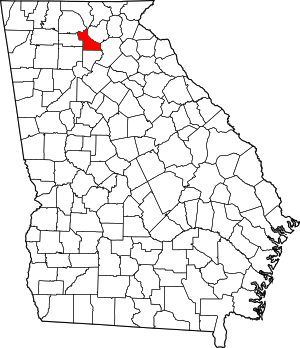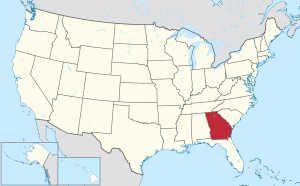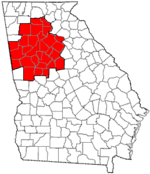Dawson County, Georgia
Dawson County | |
|---|---|
 Dawson County Courthouse in Dawsonville | |
 Location within the U.S. state of Georgia | |
 Georgia's location within the U.S. | |
| Coordinates: 34°26′N 84°10′W / 34.44°N 84.17°W | |
| Country | |
| State | |
| Founded | 1857 |
| Named for | William Crosby Dawson |
| Seat | Dawsonville |
| Largest city | Dawsonville |
| Area | |
• Total | 214 sq mi (550 km2) |
| • Land | 211 sq mi (550 km2) |
| • Water | 3.6 sq mi (9 km2) 1.7% |
| Population (2020) | |
• Total | 26,798 [1] |
| Time zone | UTC−5 (Eastern) |
| • Summer (DST) | UTC−4 (EDT) |
| Congressional district | 6th |
| Website | www |
Dawson County is a county in the Northeast region of the U.S. state of Georgia. As of the 2020 census, the population was 26,798 up from 22,330 in 2010.[2][1] The county seat is Dawsonville.[3]
Dawson County is included in the Atlanta metropolitan statistical area. Its natural resources include Amicalola Falls, the highest falls in Georgia and one of the Seven Natural Wonders of the state.
History
[edit]Dawson County was created on December 3, 1857, from Gilmer and Lumpkin Counties.[4] It is named for William Crosby Dawson, a U.S. Senator from Georgia.[5]
American Civil War
[edit]The 1860s brought war and hardships to the people of Dawson County. Many men of Dawson County answered the call and went to fight in the Civil War. Several Confederate units were raised in Dawson County, including:
- 21st Regiment, Georgia Infantry, Company E Concord Rangers
- 22nd Regiment, Georgia Infantry, Company I, Dawson County Independents
- 38th Regiment, Georgia Infantry, Company I (Wright's Legion), Dawson Farmers
- 38th Regiment, Georgia Infantry, Company L (Wright's Legion)
- 52nd Regiment, Georgia Volunteer Infantry, Company I
The 1st Georgia Infantry Battalion (Union), Companies B and C also was raised there.
Post-Civil War to present
[edit]Dawson County is known for its long involvement in auto racing, which was established in the 20th century; many of the original NASCAR racers came from this area, and Dawsonville is now one of a few areas considered to be the "birthplace of stock car racing".[6] Local racing skills are said to have been developed by men who ran moonshine down Georgia State Route 9, also known as Thunder Road, to Atlanta. The celebration of Dawson County's history and its involvement in bootlegging moonshine during the Prohibition era now occurs every October, dubbed the Moonshine Festival.
Locals have referred to Dawson County as the "Moonshine Capital of the World". This title is claimed by many other cities and communities, but is fiercely defended by residents of the area. Allegedly, bootleggers took advantage of the county's relative isolation and the ability to move so much moonshine to the larger cities, especially Atlanta, during the United States Prohibition era.
Education
[edit]Dawson County currently serves grades K-12. It has a total of seven schools - one for pre-K, four for grades K-5, one for grades 6–7, one for grades 8–9, and Dawson County High School (grades 10–12).
Geography
[edit]
According to the U.S. Census Bureau, the county has a total area of 214 square miles (550 km2), of which 211 square miles (550 km2) are land and 3.6 square miles (9.3 km2) (1.7%) are covered by water.[7]
The county is located in the foothills of the Blue Ridge Mountains. Portions of the mountain chain extend into the far northern and western portions of the county, with elevations around 3,500 ft. in this area.
Part of Lake Lanier is in the southeastern part of the county and the boundary lines with neighboring counties pass through the lake. The 729-foot (222 m) Amicalola Falls, are located in the county. The Amicalola Falls are the highest in Georgia, the tallest cascading waterfall east of the Mississippi River, and one of the Seven Natural Wonders of Georgia. The highest point in the county is Black Mountain, with an elevation of 3,600 feet (1,100 m). The Chestatee and Etowah Rivers flow through Dawson County.
The vast majority of Dawson County is located in the Etowah River subbasin of the ACT River Basin (Coosa-Tallapoosa River Basin). The southeastern tip of the county is located in the Upper Chattahoochee River subbasin of the Apalachicola-Chattahoochee-Flint River Basin, and a very small northern section of Dawson County is located in the Coosawattee River subbasin of the larger ACT River Basin.[8]
Adjacent counties
[edit]- Fannin County - north
- Lumpkin County - northeast
- Hall County - east
- Forsyth County - south
- Cherokee County - southwest
- Pickens County - west
- Gilmer County - northwest
National protected area
[edit]Communities
[edit]Cities
[edit]Unincorporated communities
[edit]- Juno
- Afton
Private communities
[edit]Several large, gated, private communities function similar to a municipality, providing many municipal-type services that operate independently of county government.
Demographics
[edit]| Census | Pop. | Note | %± |
|---|---|---|---|
| 1860 | 3,856 | — | |
| 1870 | 4,369 | 13.3% | |
| 1880 | 5,837 | 33.6% | |
| 1890 | 5,612 | −3.9% | |
| 1900 | 5,442 | −3.0% | |
| 1910 | 4,686 | −13.9% | |
| 1920 | 4,204 | −10.3% | |
| 1930 | 3,502 | −16.7% | |
| 1940 | 4,479 | 27.9% | |
| 1950 | 3,712 | −17.1% | |
| 1960 | 3,590 | −3.3% | |
| 1970 | 3,639 | 1.4% | |
| 1980 | 4,774 | 31.2% | |
| 1990 | 9,429 | 97.5% | |
| 2000 | 15,999 | 69.7% | |
| 2010 | 22,330 | 39.6% | |
| 2020 | 26,798 | 20.0% | |
| 2023 (est.) | 31,732 | [9] | 18.4% |
| U.S. Decennial Census[10] 1790-1960[11] 1900-1990[12] 1990-2000[13] 2010-2019[2] 2020[1] | |||
| Race | Num. | Perc. |
|---|---|---|
| White (non-Hispanic) | 23,544 | 87.86% |
| Black or African American (non-Hispanic) | 200 | 0.75% |
| Native American | 63 | 0.24% |
| Asian | 235 | 0.88% |
| Pacific Islander | 14 | 0.05% |
| Other/Mixed | 1,137 | 4.24% |
| Hispanic or Latino | 1,605 | 5.99% |
As of the 2020 United States census, there were 26,798 people, 9,041 households, and 6,491 families residing in the county. Between 2021 and 2022, Dawson experienced a 5.8% growth in population, making it the fourth fastest growing county in the nation.[15]
In 2010, median income for a household in the county was $51,128 and the median income for a family was $60,236. Males had a median income of $41,726 versus $31,978 for females. The per capita income for the county was $25,557. About 7.8% of families and 12.0% of the population were below the poverty line, including 16.0% of those under age 18 and 5.3% of those age 65 or over.[16] In 2000, the median income for a household in the county was estimated at $51,989, and for a family was estimated at $60,455. About 8.9% of families and 13.5% of the population were below the poverty line, including 16.0% of those under age 18 and 6.3% of those age 65 or over.[17]
Politics
[edit]Dawson County was the only county that supported Thomas Dewey in 1948 and then supported Adlai Stevenson II in 1952.[18]
| Year | Republican | Democratic | Third party(ies) | |||
|---|---|---|---|---|---|---|
| No. | % | No. | % | No. | % | |
| 2024 | 16,115 | 82.38% | 3,350 | 17.13% | 96 | 0.49% |
| 2020 | 13,398 | 83.30% | 2,486 | 15.46% | 200 | 1.24% |
| 2016 | 9,900 | 83.76% | 1,448 | 12.25% | 472 | 3.99% |
| 2012 | 8,847 | 86.19% | 1,241 | 12.09% | 176 | 1.71% |
| 2008 | 8,242 | 82.54% | 1,632 | 16.34% | 112 | 1.12% |
| 2004 | 6,649 | 81.87% | 1,407 | 17.33% | 65 | 0.80% |
| 2000 | 4,210 | 71.38% | 1,458 | 24.72% | 230 | 3.90% |
| 1996 | 2,343 | 54.41% | 1,434 | 33.30% | 529 | 12.29% |
| 1992 | 1,696 | 43.58% | 1,399 | 35.95% | 797 | 20.48% |
| 1988 | 1,908 | 71.03% | 761 | 28.33% | 17 | 0.63% |
| 1984 | 1,322 | 67.28% | 643 | 32.72% | 0 | 0.00% |
| 1980 | 729 | 39.68% | 1,072 | 58.36% | 36 | 1.96% |
| 1976 | 370 | 21.09% | 1,384 | 78.91% | 0 | 0.00% |
| 1972 | 828 | 78.26% | 230 | 21.74% | 0 | 0.00% |
| 1968 | 509 | 31.81% | 246 | 15.38% | 845 | 52.81% |
| 1964 | 639 | 40.67% | 932 | 59.33% | 0 | 0.00% |
| 1960 | 401 | 30.45% | 916 | 69.55% | 0 | 0.00% |
| 1956 | 613 | 45.95% | 721 | 54.05% | 0 | 0.00% |
| 1952 | 470 | 37.90% | 770 | 62.10% | 0 | 0.00% |
| 1948 | 786 | 52.82% | 660 | 44.35% | 42 | 2.82% |
| 1944 | 342 | 42.17% | 469 | 57.83% | 0 | 0.00% |
| 1940 | 276 | 36.17% | 484 | 63.43% | 3 | 0.39% |
| 1936 | 322 | 46.07% | 377 | 53.93% | 0 | 0.00% |
| 1932 | 105 | 15.53% | 567 | 83.88% | 4 | 0.59% |
| 1928 | 290 | 46.62% | 332 | 53.38% | 0 | 0.00% |
| 1924 | 264 | 48.35% | 279 | 51.10% | 3 | 0.55% |
| 1920 | 354 | 58.22% | 254 | 41.78% | 0 | 0.00% |
| 1916 | 29 | 3.91% | 440 | 59.30% | 273 | 36.79% |
| 1912 | 23 | 6.42% | 170 | 47.49% | 165 | 46.09% |
Transportation
[edit]Major highways
[edit] U.S. Route 19
U.S. Route 19 State Route 9
State Route 9 State Route 52
State Route 52 State Route 53
State Route 53 State Route 136
State Route 136 State Route 183
State Route 183 State Route 400
State Route 400
Pedestrians and cycling
[edit]- Springer Mountain Trail
Notable people
[edit]- Bill Elliott - NASCAR racer, 1988 Cup Series champion, and Hall of Fame member
- Chase Elliott - NASCAR racer and 2014 NASCAR Xfinity Series champion, and 2020 NASCAR Cup Series champion
- Gober Sosebee - stock-car racer (three-time Daytona champion)
- Jerry Glanville - National Football League head coach, NASCAR driver
- Bill Goldberg - professional wrestler and actor (once resided in Dawson County)
- Kevin Tanner - politician and Commissioner of the Georgia Department of Behavioral Health and Developmental Disabilities
- Will Wade - politician and member of the Georgia House of Representatives
See also
[edit]References
[edit]- ^ a b c US 2020 Census Bureau report, Dawson County, Georgia
- ^ a b "State & County QuickFacts". United States Census Bureau. Archived from the original on June 7, 2011. Retrieved February 15, 2014.
- ^ "Find a County". National Association of Counties. Archived from the original on May 31, 2011. Retrieved June 7, 2011.
- ^ Krakow, Kenneth K. (1975). Georgia Place-Names: Their History and Origins (PDF). Macon, GA: Winship Press. p. 59. ISBN 0-915430-00-2. Archived (PDF) from the original on September 17, 2003.
- ^ Gannett, Henry (1905). The Origin of Certain Place Names in the United States. Govt. Print. Off. pp. 101.
- ^ "The Unofficial History of Stock Car Racing Part 1: 1896-1936 | SpeedwayMedia.com". April 23, 2014. Retrieved February 20, 2024.
- ^ "US Gazetteer files: 2010, 2000, and 1990". United States Census Bureau. February 12, 2011. Retrieved April 23, 2011.
- ^ "Georgia Soil and Water Conservation Commission Interactive Mapping Experience". Georgia Soil and Water Conservation Commission. Archived from the original on October 3, 2018. Retrieved November 19, 2015.
- ^ "Annual Estimates of the Resident Population for Counties: April 1, 2020 to July 1, 2023". United States Census Bureau. Retrieved March 31, 2024.
- ^ "U.S. Decennial Census". United States Census Bureau. Retrieved June 21, 2014.
- ^ "Historical Census Browser". University of Virginia Library. Archived from the original on August 11, 2012. Retrieved June 21, 2014.
- ^ "Population of Counties by Decennial Census: 1900 to 1990". United States Census Bureau. Retrieved June 21, 2014.
- ^ "Census 2000 PHC-T-4. Ranking Tables for Counties: 1990 and 2000" (PDF). United States Census Bureau. Archived (PDF) from the original on March 27, 2010. Retrieved June 21, 2014.
- ^ "Explore Census Data". data.census.gov. Retrieved December 14, 2021.
- ^ Report, Staff (May 23, 2023). "Two North Georgia counties among fastest growing in U.S." Now Habersham. Retrieved February 9, 2024.
- ^ "DP03 SELECTED ECONOMIC CHARACTERISTICS – 2006-2010 American Community Survey 5-Year Estimates". United States Census Bureau. Archived from the original on February 13, 2020. Retrieved December 29, 2015.
- ^ "Archived copy". Archived from the original on April 5, 2019. Retrieved November 21, 2013.
{{cite web}}: CS1 maint: archived copy as title (link) - ^ "Re: Dole 1996/Gore 2000 counties". Talk Elections. Retrieved December 11, 2021.
- ^ Leip, David. "Dave Leip's Atlas of U.S. Presidential Elections". uselectionatlas.org. Retrieved March 19, 2018.
External links
[edit]- Archives of Dawson County, Roadside Georgia Archived July 19, 2018, at the Wayback Machine
- Dawson County historical marker




